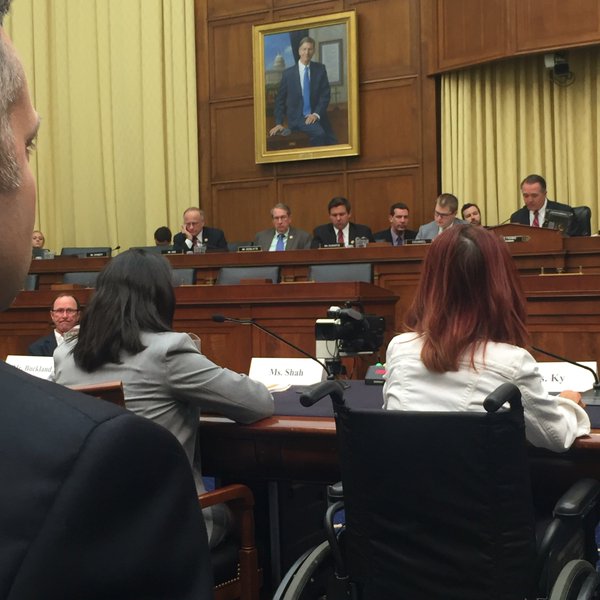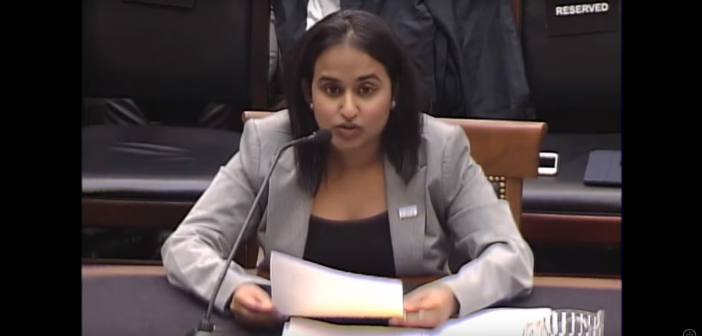Learn more on AAHOA Government Affairs and how to contribute to the AAHOA PAC at www.aahoa.com/home/advocacy.
Mili Shah has a compelling but common story about frivolous lawsuits, and now she’s got a former judge, turned lawmaker, on her side.
By Brandon VerVelde
Mili Shah grew up in her parents’ Days Inn in Milledgeville, Georgia, about 95 miles southeast of Atlanta. Like many children of Indian immigrant hoteliers, that statement is quite literal. Her family lived in the hotel that they owned and ran.
Also like many others in the hotel community, Shah chipped in to the business at a young age, learning the ins-and-outs of running a hotel at the front desk and in the back office.
“I learned firsthand how customer service is not only the pathway to a successful business, but also a hallmark of the industry,” Shah remembers.
Shah eventually pursued a career outside of the hotel industry. She attended law school and practiced law for a few years. But the hotel industry would call her back, and before she knew it she bought her first hotel and now owns two properties in Atlanta.
Little did she know her career path would uniquely prepare her for a challenge that would test her legal and hotel chops.
Last year, Shah was sued by an individual with disabilities who alleged her hotel was out of compliance with the federal Americans with Disabilities Act. Devastated – her words – by the claims that her business denied a customer the generous, kind, accessible hospitality that they not only deserve but are legally entitled to, Shah immediately investigated.
The findings stunned her. The person who filed the lawsuit never stayed or attempted to stay at her hotel. He never even had a reservation.
The lawsuit also looked…off. Something wasn’t right about it.
Flipping through the pages of the suit, Shah read the most damning allegation a hotelier can receive. Something every hotel ought to have and the most glaring infraction under the ADA. Her hotel’s pool lacked an accessible entry, a pool lift.
However, the pool is closed, empty and covered and always has been as long as she’s owned the property.
Then it clicked. The lawsuit was identical – nearly word-for-word – to one filed against her father.
This was a ‘drive-by lawsuit,’ as they’re known in the industry. It seems the plaintiffs in these types of suits merely drive by the property before having their lawyer prepare the paperwork.
Turns out, this particular individual is now infamous among the Atlanta business community. He’s filed nearly 100 lawsuits against local hotels and other businesses alleging accessibility violations, and Shah was the unfortunate victim of his attacks this time.
What’s in a drive-by
Drive-by lawsuits like this one usually end in the same way. The plaintiff’s lawyer sends a follow-up letter offering a settlement of the suit for a few thousand dollars. Typically, the amount is only slightly less than what it would cost the small-business owner to hire a lawyer and fight the charges in court.
Of course, lawyer fees are expensive, but they’re nothing compared to the opportunity cost of having employees sit for interviews and depositions, organize records and documents, and go to court. Not to mention the hit to the hotel’s reputation if the court battle is picked up by the media.
For many hoteliers, it’s a simple calculation. The settlement is cheaper, quicker and easier. The payment is made – possibly better referred to as a ransom – and the problem goes away.
Shah is fortunate. The suit against her was sloppy, and she’s also a lawyer. The plaintiff didn’t know what he was getting into when he picked a fight with her.
She decided to fight the lawsuit, a brave decision that will likely cost her thousands.
Shah’s story strikes a chord, however. The legal system in America is supposed to be about fairness. It’s supposed to be about right and wrong, and ensuring that justice is served. But there’s nothing fair, right or just about her situation.
A national epidemic
Shah’s story is unique – not many frivolous lawsuits are this blatantly bad and filed against a business owner who is also a lawyer – but the issue of baseless lawsuits against hotels is a national epidemic. More than 10,000 lawsuits alleging violations of the ADA have been filed in the last two years, many against AAHOA members.
Fortunately, federal lawmakers have taken notice through AAHOA’s efforts in our nation’s capital. One Congressman in particular heard AAHOA’s story and decided to take action. Rep. Ted Poe (R-Texas), who still goes by Judge Ted Poe from his 20 years of service as a Texas judge, introduced to Congress the ADA Education and Reform Act.
The bill’s premise is simple. When lawsuits are filed and quickly followed up by settlement offers, the alleged accessibility problem isn’t fixed. Rather, a business owner should be given the chance to correct the problem, which is exactly what the bill ensures. It gives businesses 120 days to fix the problem before a lawsuit can proceed.
To Judge Poe, Shah’s story was exceptional enough to earn her an invite to share it earlier this year with a congressional committee that was considering his legislation.
“Hotels and other small businesses have come under attack by unscrupulous attorneys and serial plaintiffs seeking to make a quick buck from small business owners like me,” Shah told the House Subcommittee on the Constitution and Civil Justice. “The intent of the ADA has always been to prohibit discrimination and to ensure all Americans have equal opportunities. Unfortunately, the law has become a weapon for scheming lawyers seeking to squeeze small business owners into quick settlements.”
Compliance or cash cow?
Judge Poe says the drive-by lawsuits are hurting the intent of the ADA itself.
“After 25 years of progress and advancement, the integrity of this landmark legislation is being threatened by a handful of lawyers and plaintiffs,” he remarked on the floor of the House when he introduced the bill.
“The goal of this legislation is to make all businesses comply with the ADA, not to be a cash cow for litigants that have never set foot in [the business],” Judge Poe concluded, urging his House colleagues to support the bill.
Expectations for the bill should be tempered, but there are positive signs that the bill might be able to move through Congress. For one, traditional political party lines have not yet been drawn on the issue. Both Democrats and Republicans on the panel had positive comments about the bill and questioned the opponents’ arguments.
Shah urged lawmakers to consider her story.
“Please help protect small business owners like myself who simply want to run our businesses free from fear that the next envelope we open might be a lawsuit that closes the doors to my hotel,” she testified.
It’s a compelling argument. ■
Brandon VerVelde is the director of State and Local Government Affairs for the Asian American Hotel Owners Association and can be reached at [email protected].
BY THE NUMBERS: THE ADA EDUCATION AND REFORM ACT
4 democrats
The bill has been cosponsored by four democratic representatives, making the bill a bipartisan effort.26 years
The original Americans with Disabilities Act was signed 26 years ago on July 26.5 pages
The legislation is just five pages long. The Affordable Care Act, known as Obamacare, was more than 2,700 pages long.35 cosponsors
The bill has been cosponsored by 35 other representatives.299 meetings
At AAHOA’s Legislative Action Summit in the spring, attendees held meetings with 299 different House and Senate offices to discuss this bill and AAHOA’s other priorities.10,000+ lawsuits
The best estimates put the number of frivolous lawsuits filed under the ADA at more than 10,000 in the past two years.





